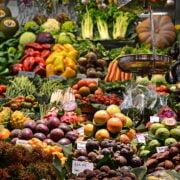
Empower Yourself with the Top Nutrition Books Recommended by Experts
Nutrition plays a crucial role in our overall health and wellness. It is the fuel that our bodies need to function properly and maintain optimal health. Good nutrition not only provides us with the energy we need to go about our daily activities, but it also supports our immune system, helps us maintain a healthy weight, and reduces the risk of chronic diseases such as heart disease, diabetes, and certain types of cancer.
In addition to its physical benefits, nutrition also has a significant impact on our mental health. Studies have shown that a healthy diet can improve mood, reduce symptoms of depression and anxiety, and enhance cognitive function. On the other hand, a poor diet that is high in processed foods, sugar, and unhealthy fats can contribute to mental health issues and impair brain function.
Key Takeaways
- Nutrition plays a crucial role in overall health and wellness.
- Experts recommend top nutrition books for gaining knowledge about healthy eating habits.
- Understanding the basics of nutrition and healthy eating habits is essential for a healthy lifestyle.
- A plant-based diet has numerous benefits and can be easily incorporated into your lifestyle.
- Nutrients play a vital role in the body, and it’s important to ensure you’re getting enough through your diet.
The Top Nutrition Books Recommended by Experts
1. “The China Study” by T. Colin Campbell
“The China Study” is often referred to as the most comprehensive study of nutrition ever conducted. In this book, T. Colin Campbell presents his findings from a 20-year study that examined the relationship between diet and disease in rural China. The book provides compelling evidence for the benefits of a plant-based diet and highlights the detrimental effects of animal-based foods on our health.
2. “In Defense of Food” by Michael Pollan
Michael Pollan’s “In Defense of Food” explores the complex world of nutrition and debunks many of the myths surrounding what we should eat. He emphasizes the importance of eating real food and encourages readers to focus on whole, unprocessed foods rather than counting calories or following fad diets.
3. “Food Rules” by Michael Pollan
Another book by Michael Pollan, “Food Rules,” offers simple guidelines for healthy eating. It provides practical advice on how to navigate the confusing world of food choices and offers 64 straightforward rules to follow for a healthier diet.
Understanding the Basics of Nutrition and Healthy Eating Habits
To understand nutrition, it is important to know the basics of macronutrients and micronutrients. Macronutrients include carbohydrates, proteins, and fats, which are the main sources of energy for our bodies. Micronutrients, on the other hand, are vitamins and minerals that our bodies need in smaller amounts but are essential for proper functioning.
Creating a balanced and healthy diet involves incorporating a variety of foods from all food groups. This includes fruits, vegetables, whole grains, lean proteins, and healthy fats. It is important to focus on nutrient-dense foods that provide a wide range of vitamins, minerals, and antioxidants. Avoiding processed foods that are high in added sugars, unhealthy fats, and artificial ingredients is also crucial for maintaining a healthy diet.
The Connection Between Nutrition and Overall Health and Wellness
Nutrition has a profound impact on both physical and mental health. A diet that is rich in fruits, vegetables, whole grains, and lean proteins can help prevent chronic diseases such as heart disease, diabetes, and certain types of cancer. It can also support a healthy weight and reduce the risk of obesity.
In terms of mental health, studies have shown that a healthy diet can improve mood and reduce symptoms of depression and anxiety. On the other hand, a diet that is high in processed foods, sugar, and unhealthy fats can contribute to mental health issues and impair brain function.
There are also specific health conditions that can be improved with proper nutrition. For example, individuals with diabetes can benefit from a diet that is low in sugar and carbohydrates to help regulate blood sugar levels. Those with high blood pressure can benefit from a diet that is low in sodium and high in potassium-rich foods such as fruits and vegetables.
The Benefits of a Plant-Based Diet and How to Incorporate it into Your Lifestyle
A plant-based diet has been shown to have numerous health benefits. It is rich in fiber, vitamins, minerals, and antioxidants, and low in saturated fats and cholesterol. Research has shown that a plant-based diet can reduce the risk of chronic diseases such as heart disease, diabetes, and certain types of cancer.
To incorporate more plant-based foods into your diet, start by adding more fruits and vegetables to your meals. Aim to fill half of your plate with fruits and vegetables at each meal. Experiment with different types of plant-based proteins such as beans, lentils, tofu, and tempeh. Replace animal-based fats with healthier plant-based fats such as avocados, nuts, and seeds.
The Role of Nutrients in Your Body and How to Ensure You’re Getting Enough
There are several essential nutrients that our bodies need to function properly. These include carbohydrates, proteins, fats, vitamins, minerals, and water.
Carbohydrates are the body’s main source of energy and should make up the majority of our daily calorie intake. They can be found in foods such as grains, fruits, vegetables, and legumes.
Proteins are important for building and repairing tissues in the body. They can be found in foods such as meat, poultry, fish, dairy products, beans, and lentils.
Fats are essential for hormone production, brain function, and the absorption of fat-soluble vitamins. Healthy sources of fats include avocados, nuts, seeds, olive oil, and fatty fish.
Vitamins and minerals are necessary for various bodily functions. They can be obtained from a balanced diet that includes a variety of fruits, vegetables, whole grains, lean proteins, and healthy fats.
Water is essential for hydration and helps regulate body temperature, transport nutrients throughout the body, and remove waste products. It is important to drink enough water throughout the day to stay properly hydrated.
To ensure you’re getting enough nutrients, focus on eating a variety of foods from all food groups. If you have specific dietary restrictions or concerns, consider consulting with a registered dietitian who can provide personalized recommendations.
The Impact of Processed Foods and How to Make Healthier Choices
Processed foods are often high in added sugars, unhealthy fats, and artificial ingredients. They are typically low in nutrients and can contribute to weight gain, chronic diseases, and poor overall health.
To make healthier choices, focus on eating whole, unprocessed foods as much as possible. This includes fruits, vegetables, whole grains, lean proteins, and healthy fats. When purchasing packaged foods, read the ingredient list and choose products that have minimal added sugars, unhealthy fats, and artificial ingredients.
The Importance of Hydration and How to Stay Hydrated Throughout the Day
Hydration is essential for overall health. Water helps regulate body temperature, transport nutrients throughout the body, and remove waste products. It is important to drink enough water throughout the day to stay properly hydrated.
To stay hydrated, aim to drink at least 8 cups (64 ounces) of water per day. However, individual needs may vary depending on factors such as activity level, climate, and overall health. It is also important to listen to your body’s thirst cues and drink water whenever you feel thirsty.
In addition to water, you can also hydrate your body with other fluids such as herbal tea, infused water, and low-sugar beverages. However, it is important to limit the intake of sugary drinks such as soda and fruit juices as they can contribute to weight gain and other health issues.
Tips for Meal Planning and Prepping for a Healthier Lifestyle
Meal planning and prepping can be incredibly helpful for maintaining a healthy lifestyle. It allows you to have nutritious meals readily available throughout the week and reduces the temptation to rely on unhealthy convenience foods.
To get started with meal planning and prepping, set aside some time each week to plan your meals and create a shopping list. Choose recipes that are balanced and include a variety of fruits, vegetables, whole grains, lean proteins, and healthy fats. Once you have your ingredients, spend some time prepping and cooking your meals in advance. This can include chopping vegetables, cooking grains and proteins, and portioning out meals into containers.
Having prepped meals on hand can make it easier to make healthier choices throughout the week. It can also save you time and money by reducing the need for takeout or dining out.
How to Stay Motivated and Consistent with Your Nutrition Goals
Staying motivated and consistent with your nutrition goals can be challenging, but it is crucial for long-term success. Here are some tips to help you stay on track:
1. Set realistic goals: Start by setting small, achievable goals that are specific, measurable, attainable, relevant, and time-bound (SMART). This will help you stay focused and motivated.
2. Find your why: Identify your reasons for wanting to improve your nutrition. Whether it’s to improve your health, have more energy, or feel better about yourself, having a strong why can help you stay motivated during challenging times.
3. Surround yourself with support: Seek support from friends, family members, or a community of like-minded individuals who share similar goals. Having a support system can provide accountability and encouragement.
4. Track your progress: Keep track of your progress by journaling or using a food diary app. This can help you identify patterns, celebrate successes, and make adjustments as needed.
5. Practice self-care: Take care of yourself by getting enough sleep, managing stress, and engaging in activities that bring you joy. When you prioritize self-care, you are more likely to make healthier choices.
6. Be flexible: Remember that perfection is not the goal. Allow yourself to indulge in moderation and be flexible with your nutrition plan. It’s important to find a balance that works for you and allows for enjoyment.
Nutrition is a fundamental aspect of our overall health and wellness. It plays a crucial role in supporting our physical and mental well-being. By understanding the basics of nutrition, incorporating more plant-based foods into our diet, ensuring we’re getting enough essential nutrients, making healthier food choices, staying hydrated, meal planning and prepping, and staying motivated and consistent with our nutrition goals, we can achieve a healthier lifestyle and improve our overall quality of life.
FAQs
What is the article about?
The article is about the top nutrition books recommended by experts to empower individuals with knowledge about nutrition.
Why is it important to read nutrition books?
Reading nutrition books can help individuals gain knowledge about healthy eating habits, understand the impact of food on the body, and make informed decisions about their diet.
Who are the experts recommending these books?
The experts recommending these books are nutritionists, dietitians, and other health professionals who have expertise in the field of nutrition.
What are some of the top nutrition books recommended in the article?
Some of the top nutrition books recommended in the article include “How Not to Die” by Michael Greger, “The China Study” by T. Colin Campbell, and “In Defense of Food” by Michael Pollan.
Are these books suitable for beginners?
Yes, these books are suitable for beginners as they are written in a way that is easy to understand and provide a good foundation for learning about nutrition.
Can these books help with weight loss?
Yes, these books can help with weight loss as they provide information about healthy eating habits and the impact of food on the body, which can help individuals make better choices about their diet.
Where can I find these books?
These books can be found at most bookstores, online retailers, and libraries.


















